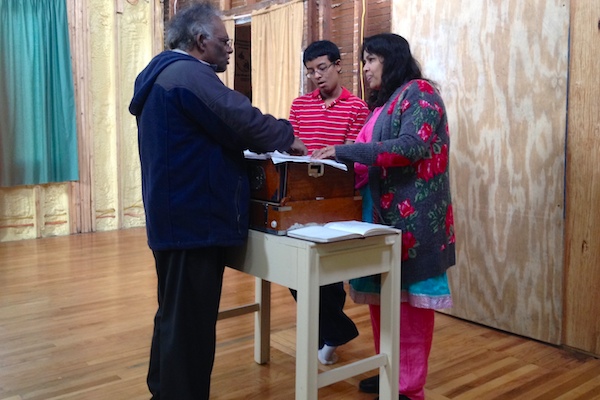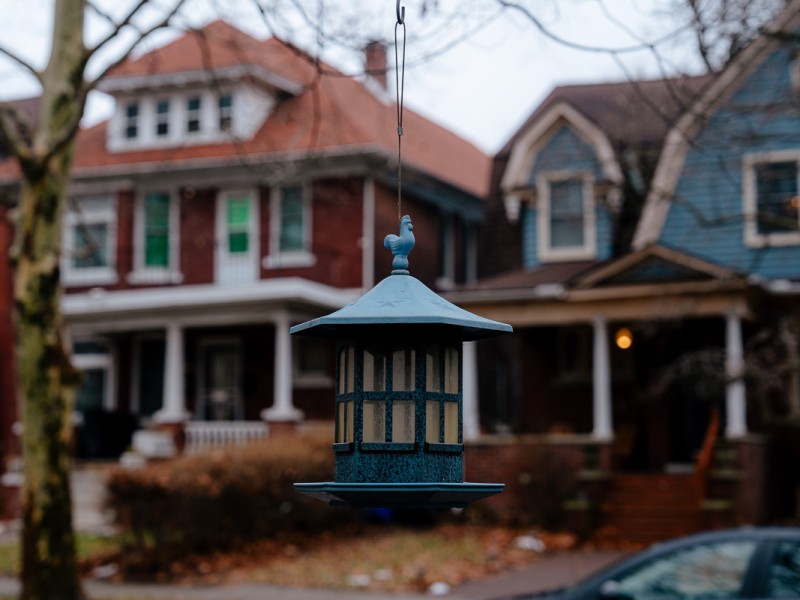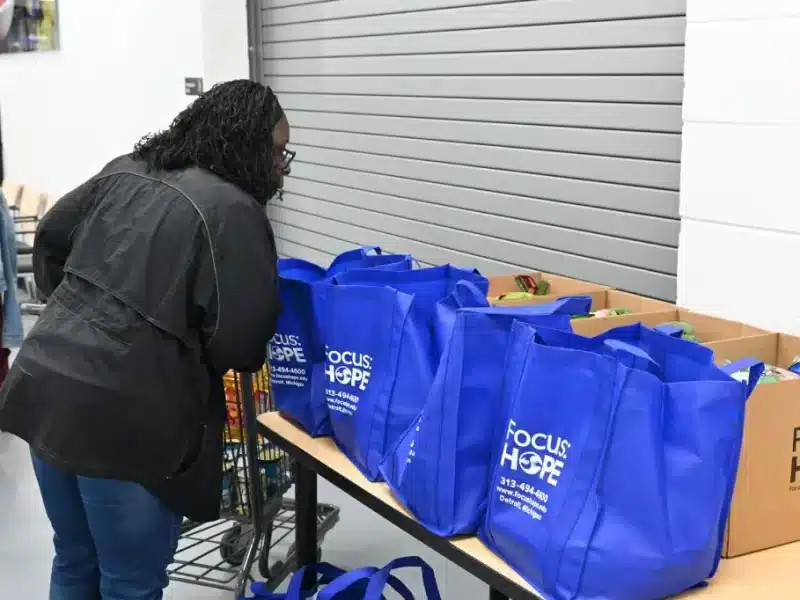Playing house on the porous border
Creative transformations are happening in the neighborhood immediately north of Hamtramck, where groups like Power House Productions and the Hinterlands are joining art with community life. Matthew Piper gets experienced at the Play House on Moran St.
What do you get when you cross experimental performance group The Hinterlands with Power House Productions, the artist-led nonprofit dedicated to creative neighborhood stabilization, one transformed vacant house at a time?
Say hello to Play House, a 1924 two-family home turned rehearsal and performance space that’s sure to be the site of some of the most exciting, original, and culturally diverse performances you’ll find in the city. But before we dig into the details of the newest kid on the Power House block, let me step back and introduce our story’s key players for the benefit of the uninitiated.
Power House Productions’ Gina Reichert and Mitch Cope started gaining local, national, and international attention back in 2008, when they began to purchase cheap, vacant houses in their neighborhood and turn them into demonstration centers for sustainable building practices and sites of innovative artistic intervention.
The neighborhood where Reichert and Cope live and work is referred to as NoHam, since it’s immediately north of Hamtramck, and Banglatown, since the majority population hails from Bangladesh. When they moved there in 2005, Reichert tells me, there were some vacant homes, but nowhere near as many as there were in the next few years, when the foreclosure crisis and soaring scrap metal prices began to do serious damage to the neighborhood. Knowing how quickly Detroit neighborhoods’ fortunes can turn, and after learning that Banglatown was considered a “transitional neighborhood, which meant it could go either way,” Reichert tells me that she and Cope decided to “be proactive and respond to the vacant property issue the only way we knew how, through the lenses of architecture and art.”
The first vacant home they bought and transformed was the Power House, which Cope, Reichert, and some friends and neighbors turned into a site of off-the-grid solar and wind energy production. From there came the formation of Power House Productions, their 501(c)(3) organization, and the purchase and creative, collaborative rehabilitation of more houses (Yellow House, Jar House, Sound House, Squash House…) over a six block area, as well as the Ride It Sculpture Park, a collection of vacant lots turned skate park. Over time, each site has become a dynamic, large-scale art piece and an investigation into both neighborhood engagement and the possibilities associated with re-imagining Detroit’s early 20th century housing stock for the 21st century.
The Hinterlands, meanwhile, are an acclaimed Detroit performance group founded in 2009 by Richard Newman and Liza Bielby that continue to astonish, challenge, and delight audiences with their original works, including the post-modern Wild West show Manifest Destiny! (there was blood on the saddle), Dreamtigers, Drive-In Radio Theatre, and The Circuit, a madcap resurrection of Vaudeville into the Internet age. The Hinterlands’ work is smart, funny, inventive, and fundamentally physical. It’s also deeply informed by a concern with cross-cultural communication; in addition to touring their performances throughout the US and in Canada, China, Kosovo, and Macedonia, Bielby and Newman have participated in targeted cultural exchanges with theatre groups in Chengdu and Shanghai, China and Prishtina, Kosovo.
The two groups got to know each other after Newman and Bielby moved into Banglatown in 2010 and started working with Cope and Reichert on neighborhood security issues. It wasn’t long before they started collaborating creatively, too; the Hinterlands performed an early version of Manifest Destiny! on the Power House lawn. As their relationship grew and the itinerant Hinterlands began looking for a professional home to call their own, all four turned their eyes to a “problem house” ripe for transformation: 12657 Moran, once a hotbed of drug activity and prostitution, soon to be reborn as Play House.
It’s a house that Cope and Reichert had been worried about for years. “It’s a corner house,” Reichert tells me, “and corner houses have a certain hold on the neighborhood.” After the absentee owner lost it in tax foreclosure, the police raided the house and the tenants moved out, taking the drugs and prostitution with them and leaving behind a filthy, vacant shell. As soon as they found out it was in tax auction, Power House Productions bid on the house and won it, and after securing a grant from ArtPlace, they began work on its cleanup and transformation in January 2013.
Upon entering the approximately 1,000 square foot house today, you immediately notice the soaring, double-height ceiling, which doesn’t seem right for a house its size. Turns out the construction team removed the majority of the second floor, giving the Hinterlands and their collaborators the opportunity to jump, leap, and throw each other into the air without fear of major head injuries. Several first floor interior walls, as well as a closet, kitchen, and bathroom have also been removed to create a wide open, 25′ x 25′ main rehearsal/performance room. Continuing Power House Production’s interest in sustainable technology, the house is heated through radiant floor heating, insulated with spray foam insulation, and all of the original windows have been replaced with double pane, high efficiency windows. Future plans call for the installation of solar panels on the roof and a water catchment system.
Work on the house isn’t exactly finished, but true to Power House form, Bielby and Newman aren’t sure it ever really will be. (“The house is, among other things, a longtime performative process,” as Newman puts it.) For now, they’re just happy to be home. Recalling the years spent “schlepping [their] stuff back and forth” from place to place, Bielby tells me, “There are times we’ve cried we’ve been so happy.”
And they’ve wasted no time turning the house into what it was intended to be: a place for the Hinterlands to rehearse, train, and develop work, but also to host intimate performances by other groups and remain vitally connected to life in the neighborhood.
One way they’re maintaining that connection is by engaging in a closer-to-home version of the cross-cultural exchange that’s been such an important part of their practice. Twice a week, most weeks, Play House is home to the Bangla School of Music, which finds Bangladeshi musician, activist, and scholar Akram Hossain teaching classical and contemporary Bangla music through singing, slide guitar, and harmonium lessons for both kids and adults (including Bielby).
“We’re just starting to program Play House,” Newman says when I ask about the Hinterlands’ long-term hopes for the space as a performance venue, “but what we’d like to do is curate different events, once a month, that bring in different kinds of people — it could be family puppetry one month, Bangla music the next, and contemporary dance another — and to make meaningful connections in the neighborhood in the process.”
What an exceptional new life for an old problem house — more good news out of a neighborhood that continues its remarkable transition into a place like no other.
This Sunday, March 16, the Hinterlands hosts Open Training, a “participatory workshop in collective creativity and ensemble-based physical performance,” from 1 to 4 pm at Play House, 12657 Moran.
From April 10 to 26, the Hinterlands presents Life is Happening To Us Again, a production by A Host of People that is “a fairly slippery show to actually describe but that deals with relationships between people and between technology and nature: where they come together, and where they diverge.” The show goes on Thursdays-Saturdays at 8 pm. The Hinterlands has begun also planning the Porous Borders Festival to be held in the neighborhood in May 2015. Stay tuned for details.
Matthew Piper is the author of Green City Diaries, a co-production of Model D and the Green Garage Urban Sustainability Library, as well as sundry other articles on Detroit art and culture. Read his account of attending a Hinterlands open training workshop at Play House in this month’s issue of Infinite Mile, a journal of art + culture(s) in Detroit.








